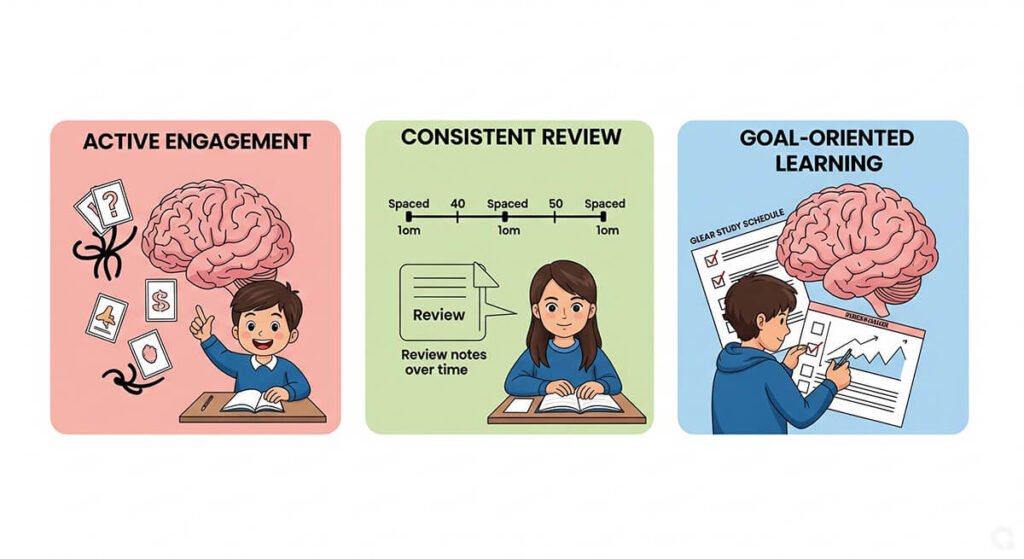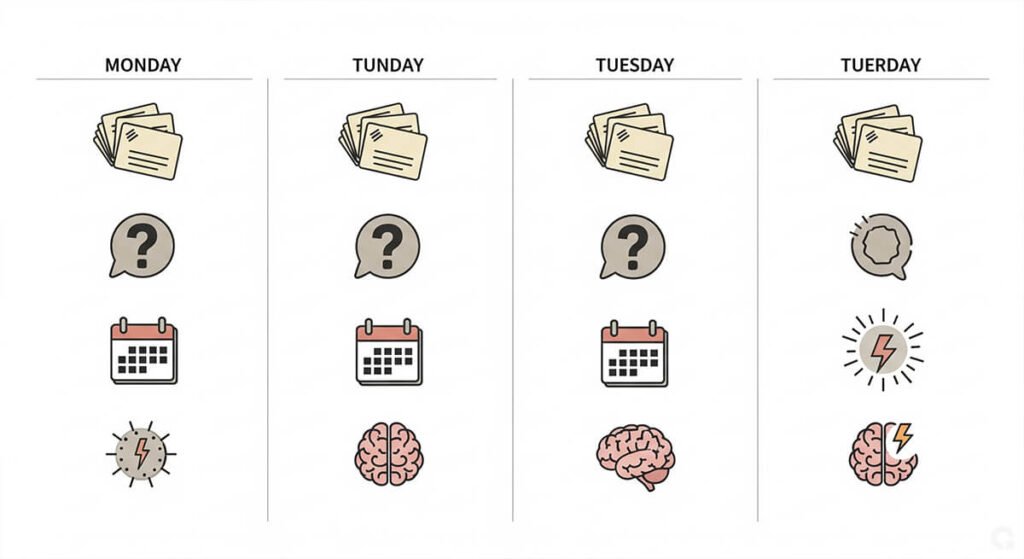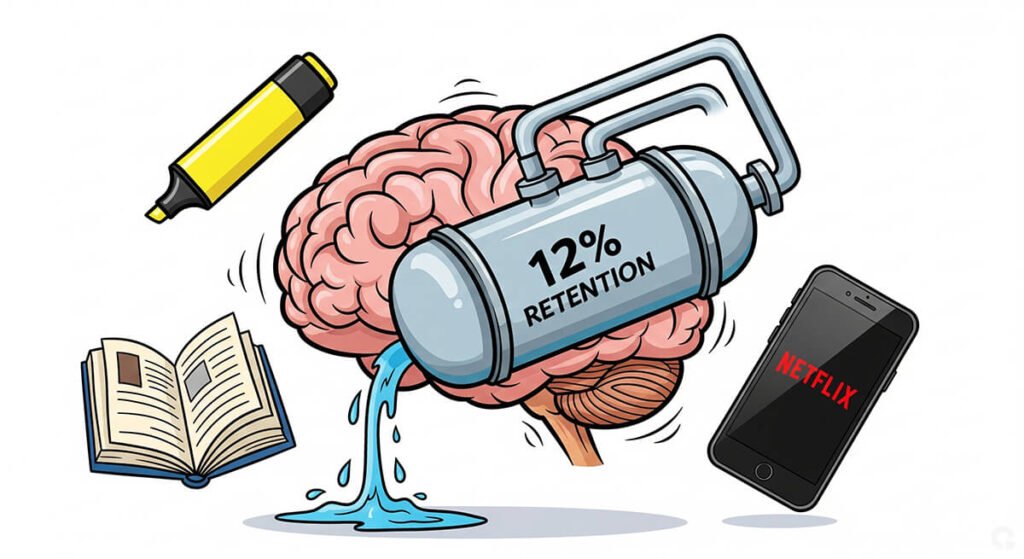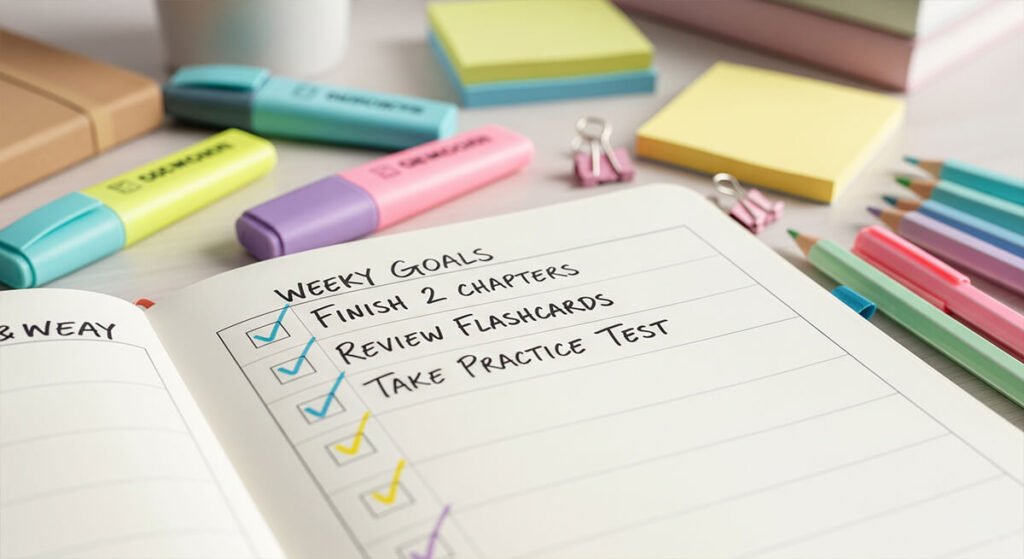Why You’re Stuck and How to Study Better.
You’ve stayed up late studying, highlighting until your eyes ache, yet your grades don’t reflect the effort you’ve put in. You might be wondering, “What am I missing? How to be good in studies?” You’re not alone in this struggle. Many students rely on passive study methods that seem productive but fail to be effective, like rereading notes, copying flashcards while browsing social media, or cramming all night. Unfortunately, these habits often lead to frustration, burnout, and a lingering sense of being unprepared.
How Wasted Time Is Hurting You (The Real Cost of Passive Study).
Rereading and highlighting feel safe, but they only help you remember about 12 percent of what you review. In two days, you’ll forget most of it. That’s because passive study tricks your brain into thinking you know more than you do. Your mind treats it like background noise and quickly lets it go.
Your Road to Improvement (Your Path to Smarter Study).
It’s not about grinding more hours; it’s about how to study in ways that your brain holds on to. In this guide, you’ll learn:
- How to Study Effectively: Three science‑backed rules.
- How to Study Smart: Mixing methods for real gains.
- Learning Tricks: Quick hacks to boost memory.
- Best Study Techniques & Best Study Methods: Ten proven tips.
- How to Study Productively: Building a weekly plan that works.
- How to Improve Your Study: Tracking progress and staying motivated.
- How to Be Good in Studies: A 4‑day routine that top students follow.
- How to Study Better: Setting up your space and schedule.
How to Study Effectively – 3 Core Principles.

Before exploring specific study methods, focus on these three essential principles that will enhance your learning:
- Active Engagement: Actively interact with your material. Instead of just reading or highlighting, summarize concepts, teach what you’ve learned to someone else, or apply ideas to real situations. This helps you retain information better.
- Consistent Review: Use spaced repetition to review material regularly over time. Don’t cram everything in one session; instead, revisit topics over days or weeks. This boosts retention and helps connect new information with what you already know.
- Goal-Oriented Learning: Set clear, measurable goals for each study session. Instead of a vague aim, break your study tasks into specific objectives, like mastering a chapter or completing practice problems. This keeps you focused and provides a sense of achievement.
By applying these principles, you can transform your study sessions into effective learning experiences.
| 9:00–9:45 | Math | Solve derivative problems |
| 10:00–10:45 | Chemistry | Balance redox equations |
| 11:00–11:45 | History | Outline causes of World War I |
| 12:00–12:45 | Biology | Draw and label cell organelles |
How to Study Smart – The 4‑Day Study Cycle.

Instead of one marathon cram session, break your week into focused days. This is how to study productively: routine mirrors top students’ habits.
| Day | Focus | Activities |
|---|---|---|
| 1 | Revisit flashcards, redo missed problems, and update mind maps | Transform lecture notes into Cornell format; write three key questions |
| 2 | Active Engagement | Timed practice test, log mistakes in a journal; review error patterns |
| 3 | Test & Feedback | Revisit flashcards, redo missed problems, and update mind maps |
| 4 | Spaced Review | Revisit flashcards, redo missed problems, update mind maps |
- Why it works: You process, practice, test, and reinforce, covering each step of learning.
- How to improve your study: Stick to this cycle every week and track your scores over time.
Want a deeper look into secret methods students use to top their exams?
👉 Check out these 3 Secret Study Tips that work
How to Study Productively – 10 Best Study Techniques

Here are 10 study tips you can start using today to learn faster and remember more.
1. Pomodoro Technique 2.0
- Classic: 25 min focus → 5 min break.
- Upgraded for deep work: 45 min focus → 15 min active break (jump rope, stretching).
- Focus Sprint: 15 min max effort → 2 min break.
2. Feynman Technique on Steroids
- Basic: Explain a concept in simple words.
- Advanced: Record yourself teaching an imaginary 12‑year‑old. Note three stumbling spots, research them, then re‑teach until smooth.
3. Mind Mapping Mastery
- Why: Visual maps reveal connections you’d miss in linear notes.
- How: Draw the central topic, add branches with keywords, and use icons (⚡ for energy, 💧 for water).
4. Environmental Engineering
- Why: Your space sets the tone for focus.
- 5‑Zone Setup:
- Lighting: 5000 K LED + daylight.
- Sound: Brown noise or soft instrumental playlists.
- Ergonomics: Chair at 90° elbow angle; screen at eye level.
- Distraction Shield: Position the desk away from the door, and use a room divider.
- Phone Jail: Lock the phone in a small timer box.
| Zone | Setup |
|---|---|
| Lighting | 5000 K LED desk lamp + natural light |
| Sound | Brown noise from MyNoise.net |
| Ergonomics | Chair and desk at correct heights |
| Distraction Shield | Room divider facing away from distractions |
| Phone Management | Phone in lockbox or on airplane mode |
5. Goal Setting & Tracking
- Why: Clear goals guide action and keep you on track.
- How: Every Sunday, pick three weekly goals (e.g., master two chapters, complete five practice exams). Use a simple table to tick off daily progress.
| Week Goals | Mon | Tue | Wed | Thu | Fri | Sat | Sun |
|---|---|---|---|---|---|---|---|
| Master derivatives | ✓ | ✓ | |||||
| Memorize 30 biology terms | ✓ | ✓ | |||||
| Complete two timed practice tests | ✓ |
6. The Neuro‑Fuel Diet
- Why: Brain cells need the right nutrients to fire efficiently.
- Key nutrients:
- Omega‑3s: salmon, walnuts, chia seeds
- Choline: eggs, liver, broccoli
- Flavonoids: dark chocolate, berries, green tea
- Snack idea: Greek yogurt + walnuts + dark chocolate chips + blueberries.
7. Hydration Hacks
- Why: Even slight dehydration hurts concentration.
- Rule: 0.5 oz water per pound of body weight per day.
- Plan: 8 oz on waking, 8 oz before each meal, 8 oz after each 90-minute study block.
8. Tech Tools for Efficiency
- Anki: Spaced‑repetition flashcards for how to study effectively.
- Forest: Gamifies focus by growing virtual trees.
- Notion: All‑in‑one workspace for notes, tasks, and flashcards.
- Otter.ai: Transcribe lectures for quick review.
- Freedom/FocusMe: Block distracting websites during study.
9. Study Groups & Body Doubling
- Why: Social accountability and peer teaching boost motivation.
- How: Form small teams (2–4). Rotate roles: explainer, challenger, note‑taker. Keep sessions under 90 minutes to maintain energy.
10. Rest & Recovery Protocol
- Why: Memory consolidates during sleep and rest.
- Sleep: Aim for 7–9 hours nightly.
- Breaks: Every 90 minutes, take a 10-minute movement break.
- Burnout: If you hit a wall, take three full days off with relaxing activities—walks, music, cooking.
Learning Tricks – Quick Hacks to Boost Recall
Flashcard Varieties
- Cloze Deletions: Hide key words in sentences for context‑based recall.
- Image‑Based Cards: Draw a tiny picture on one side to cue the fact.
Self‑Quiz Rotation
- Mix questions from different chapters or subjects. This practice of how to study smart prevents context locking.
Error Journals
- After each practice test, jot down every error. Review your journal weekly to target weak areas.
Chunking Information
- Break complex topics into 3–5 “chunks” and master each chunk before linking them together.
How to Be Good in Studies – Advanced Strategies.

Mind Palace (Method of Loci)
- What it is: Store facts in imagined rooms or landmarks in a familiar location.
- How to use it: Visualize walking through your home and placing key points on pieces of furniture. Recall by mentally retracing your steps.
Metacognition: Thinking About Thinking
- After every study session, ask:
- What did I learn?
- Which strategy worked best?
- Where do I still struggle?
- Use a simple journal to record answers and adjust the next session accordingly.
Visualization & Storytelling
- Turn dry facts into vivid mini‑stories or mental movies. Your brain remembers narratives far better than isolated details.
Self‑Explanation
- While solving problems or reading, pause every few minutes and explain aloud why each step or fact makes sense. This deepens understanding and reveals gaps.
How to Improve Your Study – Putting It All Together

Step 1: Master One Principle
- Pick Active Recall, Spaced Repetition, or Interleaving this week. Focus your sessions on practicing and refining that one skill.
Step 2: Apply Two Tips
- Combine Pomodoro 2.0 with the Feynman Technique in your next study block. Time yourself and record your explanation to see progress.
Step 3: Optimize Your Space
- Use the Environment Engineering checklist. Tweak lighting, sound, and ergonomics until you feel calm but alert.
Step 4: Track Progress
- Create a simple spreadsheet: columns for date, topic, method used, self‑rated confidence (1–5). Review weekly to spot trends.
| Date | Topic | Method Used | Confidence (1–5) |
|---|---|---|---|
| July 12 | Derivatives | Active recall + Pomodoro 2.0 | 3 |
| July 13 | Photosynthesis | Spaced rep + mind map | 4 |
| July 14 | WWI causes | Interleaving + Feynman | 2 |
Step 5: Reflect & Adjust
- End each week by revisiting your metacognition journal. What delivered the biggest gains? What felt like a waste? Adapt your plan for the next week.
How to Study Smart – Sample Weekly Plan
| Day | Morning | Afternoon | Evening |
|---|---|---|---|
| Monday | Active recall on Chapter 1 (45 min) | Pomodoro with Feynman on Chapter 2 | Flashcards review + hydration goals |
| Tuesday | Interleave Math & Chemistry (90 min) | Teach partner photosynthesis (30 min) | Spaced repetition on Monday’s material |
| Wednesday | Mind map British history (45 min) | Practice problems Physics (45 min) | Metacognition journal + rest |
| Thursday | Review flashcards (Day 2) | Derivative drills + Pomodoro | Flashcards + error journal update |
| Friday | Quiz on week’s topics (60 min) | Concept map wrap‑up | Plan next week’s goals |
| Saturday | Group study session (2 hrs) | Light review of weak spots (45 min) | Leisure reading related to the course |
| Sunday | Rest day short walk + reflection | Organize notes & plan next cycle | Early sleep |
Conclusion: Your System for Success.

You are well-equipped with the knowledge and skills needed to study effectively, intelligently, and productively by following straightforward, practical steps. You have mastered a range of learning strategies designed to enhance retention and comprehension, including techniques such as active recall, spaced repetition, and note-taking methods like the Cornell system. Your arsenal includes ten essential study tips that cover everything from creating a distraction-free environment to setting specific, achievable goals.
Furthermore, you have implemented a four-day study cycle that maximizes your learning potential by alternating subjects and revisiting material at strategic intervals, ensuring that concepts stick in your long-term memory. You also possess advanced strategies such as mind mapping and the Feynman technique, which help deepen your understanding of complex subjects. Finally, you have a well-organized sample weekly study plan tailored to balance your workload, incorporating breaks and review sessions to optimize productivity and maintain motivation. You’ve learned how to study effectively, smartly, and productively using simple, practical steps. You now possess various learning tricks, the best study techniques, and effective study methods. You are familiar with ten study tips, a four-day cycle, advanced strategies, and a sample weekly study plan.
Now it’s your turn:
- Pick one change and try it today.
- Track your progress in simple tables.
- Adjust based on what works for you.
How to Study Better – FAQs and Common Myths.
How much should I study per day?
Aim for 3–4 hours of focused, active study. Break into sessions under 90 minutes each.
Is digital or handwritten note‑taking best?
Handwriting boosts retention for conceptual material; digital excels for diagrams and code.
Can I study effectively with ADHD?
es. Use body doubling, chunked sessions, Pomodoro sprints, and fidget tools as needed.
Does highlighting help?
It can, but only if you review highlighted text actively with recall or questions.
What if I feel burned out?
Take 3 days off, focus on restorative activities, then return with a lighter schedule.
Are all subjects studied the same way?
No. Adapt techniques: mind maps for conceptual topics, problem drills for technical subjects.














